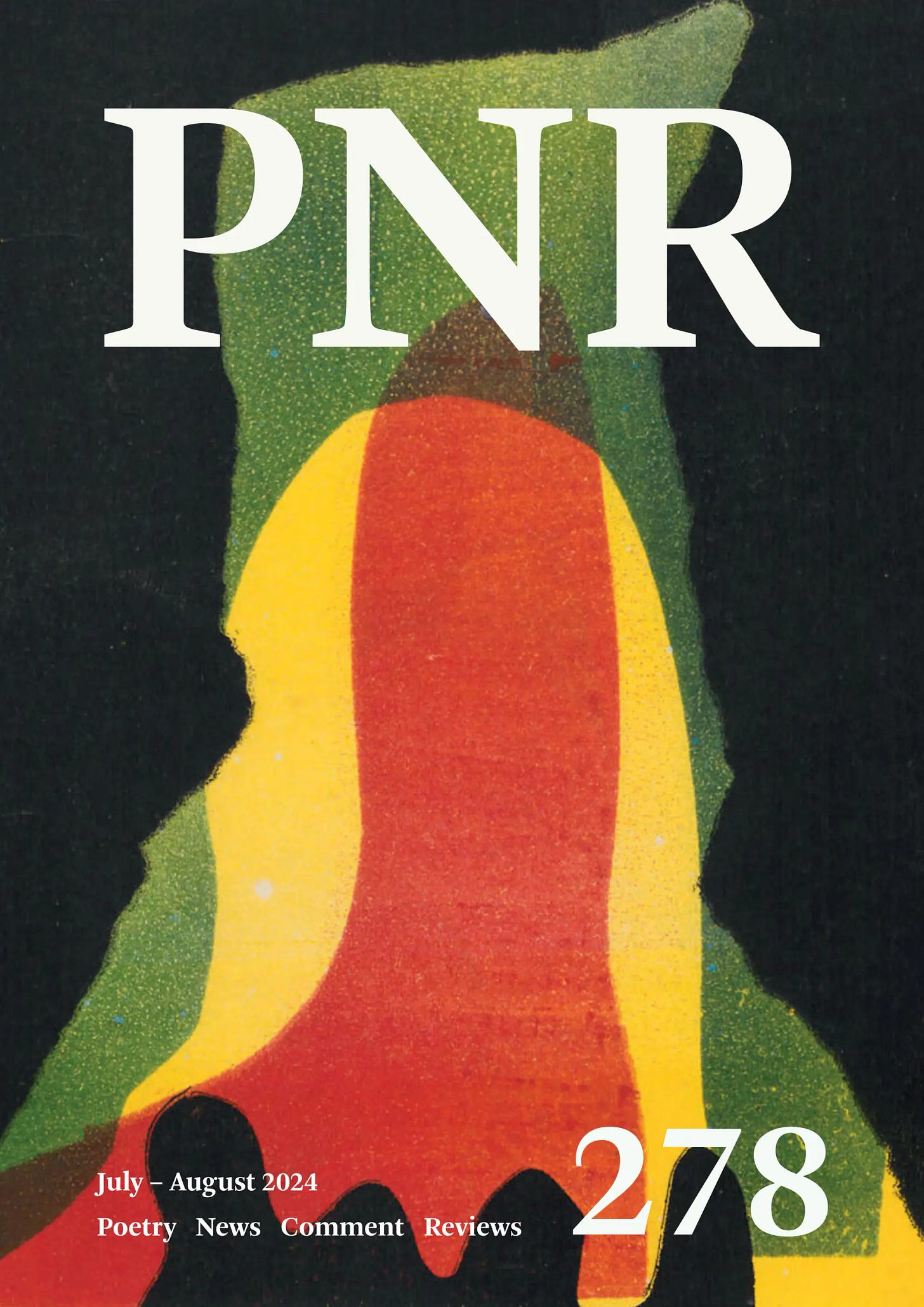Editorial
This editorial may be the last one I write in my editorial office in Cross Street. PN Review has been published from here since November 2002 (PNR 148).
Its first permanent address was at the Corn Exchange, Manchester, for twenty-
five years, until we were evicted by an IRA bomb in 1996. We spent a brief exile in Salford but settled into salubrious offices in Cross Street, along from St Anne’s Church where Thomas de Quincey was baptised, and where a homeless man asleep on a bench turns out to be a bronze Jesus displaying the stigmata. We are cater-corner from William Gaskell’s Unitarian Chapel where the publisher Charles Dickens occasionally attended services with his author Elizabeth (she contributed to Household Words where he was the ‘conductor’). When PN Review and Carcanet first settled, the chapel still stood; it has since been ingested (still a chapel) into a large office building. L.S. Lowry frequented the chop house in Chapel Walk and survives as a corpulent bronze at the bar. We arrived here on 27 November 2002.
PNR 149 was assembled, the Editorial and News & Notes written, at this cluttered readers’ table, a gift from the Central Library after the bomb. A patient schoolboy has pressed into the tooled leather covering with a blunt pencil, ‘Hession is Gay’.
Thumbing through PNR 149, I expected I would enter a different world.
Twenty-two years is a generation in poetry. But no. My editorial squared up against the American government:
Christopher Ross of the American State Department coordinates ‘public diplomacy’. He is keen to revive government sponsored cultural programmes abroad. Speaking the increasingly familiar language of cultural economics, he declares that such activities are a ‘cost-effective investment to ensure US national security’, a means of countering ‘the skewed, negative and unrepresentative’ image of America that, in his view, mass communications convey. Writers are suddenly in the front line when it comes to national security, not cannon fodder but the cannons themselves.
The first and second topics in News and Notes had contemporary resonance. The second reported how Irish-resident French novelist Michel Houellebecq ‘was acquitted by a Paris court of charges of inciting racial hatred when he declared in an interview last year that Islam was “the most stupid religion”.’ Three Muslim associations and the Human Rights League in Paris brought the case.
The first item was more immediate.
Tom Paulin, invited to lecture at Harvard, had his invitation revoked when a number of people – academics, students and alumni – took umbrage at comments he made to an Egyptian newspaper in April. Brooklyn born Jews who had settled in the West Bank, he said, ‘should be shot dead,’ adding, ‘I think they are Nazis, racists; I feel nothing but hatred for them.’
Pressure of an old-fashioned, increasingly unfamiliar sort was exerted and ‘the invitation to lecture at Harvard was restored after a flurry of publicity, in the interests of “free speech”.’ Paulin issued an apology, unsaying what he had in fact said. The late Professor Helen Vendler put the record straight:
On the basic principle of freedom of speech, Harvard University was right to reinstate its invitation to the poet Tom Paulin. It should be noted, however, that Mr Paulin is himself committed to the censorship of political opinions with which he does not agree. Last year Mr Paulin wrote to The Guardian, in London, asking why it permitted ‘Zionists’ like me and the author and critic Ian Buruma to write for and express our views in the paper. He is also a supporter of the boycott of Israeli academics, denying those who (like me) deplore the policies of the current Israeli government the right to speak in international forums, solely on the basis of their nationality.
Plus ça change. But, no: there are radical changes to acknowledge. News & Notes in this issue, twenty-two years on, is quiet. The burning issues of the new century appear to have been displaced by a sad necropolis. An abundance of death notices. Poets do grow old and prove their mortality, but so many…
Contemporary issues affecting writers are as numerous and challenging as they were in 2002. But they are toxic and divisive in a different way. PNR has grown circumspect, cautioned by its public patrons, at times cajoled by its allies. Indirection becomes the indicated route.
Not a comfortable route. The universal mantras of inclusion can feel, can be hostile to an insistence on editorial selectivity and the judgement of relative value implicit in making choices. The request that performance poetry exist also as compelling and coherent text might find itself dismissed as elitist. Specialists and learned readers are stigmatised for their knowledge, however generous they are in sharing it. In a radio interview not long ago I was asked for an ‘expert opinion’ on a piece of popular verse: then the presenter said, ‘We’ve heard what the Professor has to say – what do you think?’ to my eager fellow contributor. The word ‘Professor’ carried at least six sibilants, like the serpent in the garden. It can feel like a time of devaluation, dismantling, demolition, a privileging of ‘the other’ even when its otherness is not understood. A time of forked tongues, not always the serpent’s.
Amazing how much mud sticks to one’s boots after twenty-two years. Leaving the Corn Exchange was much easier, barefoot.
This editorial is taken from PN Review 278, July-August 2024. Subscribe to PN Review magazine at pnreview.co.uk.
If you are engaged by what you read on our free Substack, do consider subscribing to the magazine. Like all independent literary magazines, PN Review relies on paid subscribers to survive. Subscribers have access to our entire fifty year archive, plus six new issues per year, in print and digital form.





Thanks for the swan song, Michael. But I hope this won't be the last editorial from you, even if future ones may be sung from a different perch!